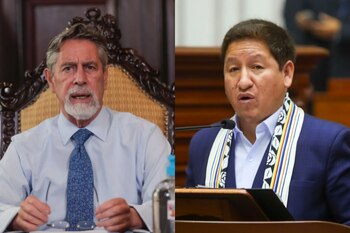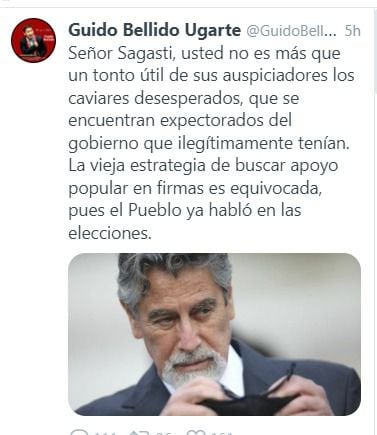
The former premier and current parliamentarian of Peru Libre, Guido Bellido, used his social networks to comment on the interview that he had former president Francisco Sagasti with Fourth Power, mentioned that “he is nothing more than a useful fool of his sponsors the caviars”.
“Mr. Sagasti, you are nothing but a useful fool of your sponsors the desperate caviars, which are expectorated from the government they illegitimately had. The old strategy of seeking popular support in firms is wrong, as the People have already spoken in the elections,” he commented on his Twitter account.

Let us recall that this Sunday, through an interview with Fourth Power, former President Francisco Sagasti presented himself, who criticized the administration of the current President of the Republic, Pedro Castillo, who so far in his term of office has presented four ministerial cabinets with questioned members.
“In the case of the Executive there is an inability to appoint probate officials, it seems that having a record is a kind of requirement in some cases. We have never had more than 40 ministers in less than nine months of government,” he said in dialogue with Fourth Power.
Sagasti reiterated that nowhere in the Constitution does the motion of presidential vacancy due to permanent moral incapacity be endorsed, so that the initiative presented by Parliament would not be misconceived; however, he argued that the head of state lacks discernment between the private and public interest.
“I am against interpretations of permanent moral incapacity, which trivialize the causes of vacancy, there must be a well-established causality. In addition, these should be specified in detail in the Constitution,” said the former president.
“There is no doubt that President Castillo Terrones has shown that he does not know how to distinguish between private interest and public interest. We have several cases in which we prefer to look for people around them,” he added.
Along these lines, he reported that if the Legislative and Executive do not agree, “citizens can request a constitutional amendment to shorten the presidential and congressional period. For this, 75,600 signatures are needed.”
This is a constitutional reform bill regulated by Law 26300 which deals with the rights of participation and citizen control.
Sagasti added that agreement should be reached to establish what would be the “minimum changes” to be made to the Constitution in order to shorten the periods and implement electoral reforms that “help” filter candidates and have congressmen and an executive up to what the country requires.
OTHER SOLUTIONS
In addition, in a column he published in the newspaper La República, Sagasti stated that a less traumatic scenario would be to “overcome the trap” between the Executive, Legislative and political parties with the participation and monitoring of civil society. He also pointed out that the Council of Ministers should be recomposed and that there should be “competent, honest and unethical persons” in the public administration.
Along these lines, he indicated that a consultation cabinet should be formed, “not make constitutional or legal changes that affect the balance between powers of the State, nor should legislation that weaken public institutions” be adopted by Congress. He mentioned that both the Executive and the Legislative “must commit themselves not to interfere with the Public Prosecutor's Office and the Judiciary.”
“Otherwise, political instability, economic uncertainty, corruption and administrative chaos will have negative consequences for the entire population, particularly for the most vulnerable,” he said.
Sagasti said he did not agree with the interpretations of “permanent moral incapacity” in relation to vacancy, which he said should be specified by the Constitutional Court.
KEEP READING
Últimas Noticias
Debanhi Escobar: they secured the motel where she was found lifeless in a cistern
Members of the Specialized Prosecutor's Office in Nuevo León secured the Nueva Castilla Motel as part of the investigations into the case

The oldest person in the world died at the age of 119
Kane Tanaka lived in Japan. She was born six months earlier than George Orwell, the same year that the Wright brothers first flew, and Marie Curie became the first woman to win a Nobel Prize

Macabre find in CDMX: they left a body bagged and tied in a taxi
The body was left in the back seats of the car. It was covered with black bags and tied with industrial tape
The eagles of America will face Manchester City in a duel of legends. Here are the details
The top Mexican football champion will play a match with Pep Guardiola's squad in the Lone Star Cup

Why is it good to bring dogs out to know the world when they are puppies
A so-called protection against the spread of diseases threatens the integral development of dogs




